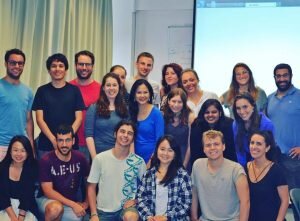Sarah Zweifach is an MD candidate at NYU School of Medicine and has dedicated her professional life to driving better health outcomes by bridging the gap between medicine and technology. She spent this summer in Israel—an international hotbed for startups–at a program provided by Hebrew University in Jerusalem called Transdisciplinary Innovation Program (TIP). In this 3-part blog series, Sarah shares her insights on how Israel has become a preeminent leader in the startup world and also reflects upon how future entrepreneurs at NYU and beyond, might learn from this small country’s success stories. Read Part 1 and Part 2 of the series.
Innovation Can Come From Within
Many entrepreneurship gurus say it is next to impossible to innovate from within.
 It turns out that no matter which country, large corporations face the same struggle. Throughout our program we saw countless examples of innovation across disciplines, but very few big corporations were successful in innovating from within, or developing "intrapreneurship." Dr. Michal Hemmo-lotem, VP for Innovation at Sheba Medical Center, the Middle East’s largest hospital, shared with us that while Sheba is one of the most innovative hospitals in the world, disruption within a medical system is no easy feat. I have certainly seen this resistance in America. And, to Michal’s point, in the hospital not only do you have the uphold-the-status-quo mindset, but also concerns of patient safety and governmental regulation hinder the desire to innovate from within.
It turns out that no matter which country, large corporations face the same struggle. Throughout our program we saw countless examples of innovation across disciplines, but very few big corporations were successful in innovating from within, or developing "intrapreneurship." Dr. Michal Hemmo-lotem, VP for Innovation at Sheba Medical Center, the Middle East’s largest hospital, shared with us that while Sheba is one of the most innovative hospitals in the world, disruption within a medical system is no easy feat. I have certainly seen this resistance in America. And, to Michal’s point, in the hospital not only do you have the uphold-the-status-quo mindset, but also concerns of patient safety and governmental regulation hinder the desire to innovate from within.
However, there was one industry in Israel where I saw rapid innovation taking place from within—cyber security. One of our class field trips was to Beersheba—a city in the Israeli desert. I know you’re thinking Bedouins and camels, but Israel has revolutionized this desert. Beersheba is a cyber city. And though the term has been thrown around so much in the startup world that it has lost its meaning, ecosystem is the only way I can define Beersheba. The multibillion dollar mega complex is home to not just large corporations such as IBM, Cisco, Paypal, and Telekom, but also the IDF’s (Israeli Defense Force) cyber intelligence base, and Ben Gurion University, an Israeli academic powerhouse for cyber research. Additionally, startup companies are incentivized by the government to headquarter in Beersheba. The cyber city melting pot truly has it all—young talent, industry backing, research capabilities, and a startup mentality.
Our cyber security teacher Dudu Mimran, CTO of Deutsche Tekekom Innovation Labs @ Ben Gurion University, put it best “Beersheba can be defined with confidence as the emerging cyber capital of the world. You can find a mix of professors, young researchers, entrepreneurs, venture capitalists and large corporations all located in the same physical place, talking and thinking about cyber and converging into this new-born cyber industry.”
One could argue that building a cybersecurity ecosystem from dust (literally) is not exactly “innovating from within,” but I would disagree. The big industry players in Beersheba, and the government, made the distinct choice to break the status quo, and rethink growth strategies. They’ve chosen to invest in progress, research, and , perhaps most importantly, the cultivation of a transdisciplinary, “intrapraneurial” ecosystem that exceeds the limits of each enterprise.
________________________________________________________________________
Author's Bio: Prior to medical school, Sarah worked in a variety of digital health settings, from a life sciences-focused data analytics startup, Zephyr Health, to a seed fund for digital health, Rock Health, and, most recently, one of the largest healthcare corporations, McKesson, doing product marketing for an oncology-specific EMR. Sarah’s work in medical technology, coupled with previous experience in integrative medicine and wellness, reflects her belief that to solve healthcare’s most pressing challenges, multi-disciplinary teamwork and solutions are necessary. Currently, in addition to being a medical student, Sarah advises health tech startups, produces a digital medicine newsletter for Mt. Sinai’s App Lab, and also works closely with physician entrepreneurs to grow the digital health ecosystem at NYU.



